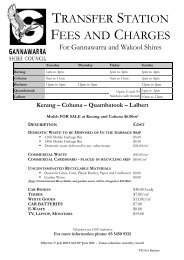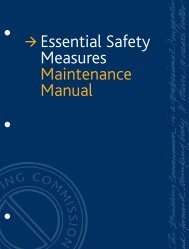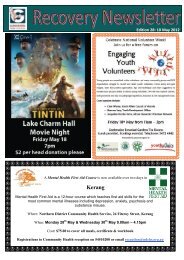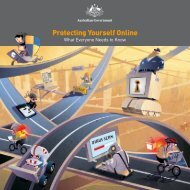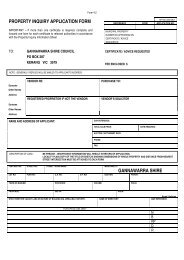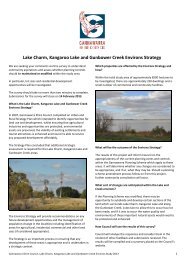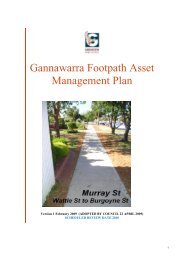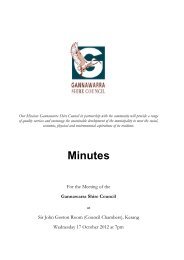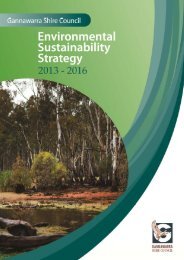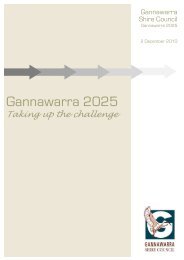Elder Abuse Policy - Gannawarra Shire Council
Elder Abuse Policy - Gannawarra Shire Council
Elder Abuse Policy - Gannawarra Shire Council
Create successful ePaper yourself
Turn your PDF publications into a flip-book with our unique Google optimized e-Paper software.
Risk factors (See pages 16 to 18 – With respect to age 2009)<br />
Risk identification in <strong>Elder</strong> <strong>Abuse</strong> is complex. The following risk factors may help to identify older people<br />
who are at a higher risk of abuse and may indicate a need for extra support and services to reduce their<br />
risk of abuse.<br />
Family violence – Family violence can occur in a number of circumstances and in a range of family<br />
settings. It can take the form of abuse of the elderly, sibling abuse, violence between same-sex<br />
couples, adolescent children being violent towards parents, carers being violent towards a person<br />
with a disability, or female-to-male partner violence.<br />
Isolation – If an older person and the carer are socially isolated, lacking supportive contacts and<br />
social networks, there may be an increased risk of abuse and neglect.<br />
Dependency – Dependence of a frail older person on a family carer is not necessarily a cause of<br />
abuse. An abusing relative is more likely to be materially dependent on an older person than nonabusing<br />
relatives (refer to Pillemer and Finkelhor, 1989).<br />
Psychopathology in an abuser – The abuser may be dependent on an older person for material<br />
support, and have a mental health condition as well as dependencies, such as alcoholism or drug<br />
abuse. An abuser may also have carer responsibilities.<br />
Stress in the care relationship – Caring for a frail and dependent older person can be extremely<br />
stressful. The carer may have adopted the role through a sense of duty or pressure from other<br />
relatives. Sometimes carers experience resentment, frustration or anger. These feelings —<br />
however they are expressed — may be reciprocated by the dependent person. Few people enjoy<br />
being dependent on others for basic daily living needs.<br />
Difficulties accepting care due to health status – In some situations, an older, dependent person<br />
may abuse a carer. This may occur due to difficulty in accepting reliance on another person.<br />
Psychiatric illness or dementia may result in aggression or a loss of insight and perspective.<br />
Older parents caring for a mature-aged child with a disability – Sometimes, situations of abuse<br />
occur where older parents are caring for a relative with a disability. Many parents of children with<br />
disabilities remain primary carers into late middle age and beyond. They are usually co-resident,<br />
primary carers of their children who predominantly have an intellectual disability or, less<br />
frequently, an acquired brain injury (ABI) or physical disability, for example, multiple sclerosis,<br />
cerebral palsy or multiple chronic illnesses.<br />
Primary carers may be up to, or even beyond, eighty years of age. These living/caring<br />
arrangements are usually based on a strong commitment by the carer to continuing care, and are<br />
most likely to be of mutual satisfaction to both parties. The living arrangement often involves the<br />
co-resident person with a disability taking an active role in running the household.<br />
For the carer, these arrangements may also result in social isolation, depression and poor health.<br />
The factors that lead to abuse of the carer are complex, and can involve isolation, the challenging<br />
behaviour of the person with the disability, increasing frailty of the carer, and belief by both<br />
parties that there no alternatives to their present situation.<br />
Other risk factors may include:<br />
Lack of information about their rights<br />
Insufficient planning for a purposeful and secure old-age<br />
Existing frailty or physical dependency or the expectation or fear of approaching frailty<br />
Psychological dependency<br />
Inadequate social networks and poor housing conditions<br />
Cultural factors<br />
<strong>Elder</strong> <strong>Abuse</strong> Prevention Strategy – <strong>Policy</strong> Document – available through Office of Senior Victorians<br />
February 2011 page 8



